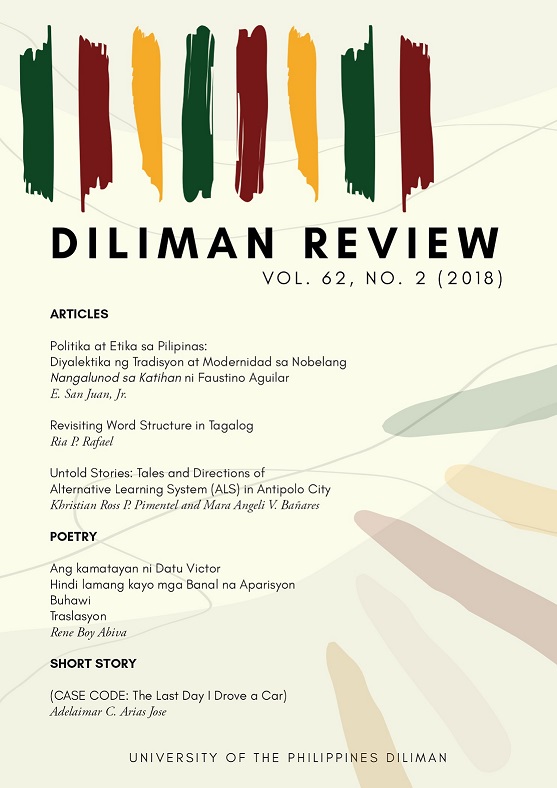POLITIKA AT ETIKA SA PILIPINAS: Diyalektika ng Tradisyon at Modernidad sa Nobelang Nangalunod sa Katihan ni Faustino Aguilar
Abstract
Dramatizing the fraught transition of the feudal-agrarian Philippines into a mixed economy during the first years (1899- 1909) of U.S. colonial domination, the novel distils class-conflict into a family tragedy. But the central theme focuses on the influence of comprador/commercial ideology on the native elite and their subalterns. Don Hasinto, the landlord-cacique of Balingkahoy, rapes a peasant women and ruins the future of her family. Her fiance Pedro, a peasant-worker, moves to the city for income to fulfill his promise to Lusia. His contradictory experience with the urban proletariat sharpens his sensibility, It introduces him to the middle-stratum, the intellectual Dimas-Ilaw who embodies the submerged nationalist tradition of the 1896 revolution. Pedro acquires a collectivist consciousness and civic spirit. However, his sympathy with the victim (his beloved Lusia and her family) forces him to vow revenge (lex talionis). Pedro’s slaying of Don Hasinto induces a catharsis, a purification of polluted ground. Pursuing the code of familial-clan ethics, Pedro’s act vindicates patriarchal honor, but fails to enlighten the folk stifled by feudal-comprador politics. The ethics of revenge, however, is subsumed by the popular, nationalist teachings of Dimas-Ilaw who moves to Balingkahoy. Dimas-Ilaw’s conceptualization of what happened in the town reconfigures personalist ethics, prophesying structural changes triggered by the act of peasant defiance of the ruling landlord-patrimonal politics of the colony.
Published
2020-12-22
How to Cite
SAN JUAN, JR, E..
POLITIKA AT ETIKA SA PILIPINAS: Diyalektika ng Tradisyon at Modernidad sa Nobelang Nangalunod sa Katihan ni Faustino Aguilar.
Diliman Review, [S.l.], v. 62, n. 2, dec. 2020.
ISSN 0012-2858. Available at: <https://journals.upd.edu.ph/index.php/dilimanreview/article/view/7400>. Date accessed: 04 sep. 2025.
Issue
Section
Articles


